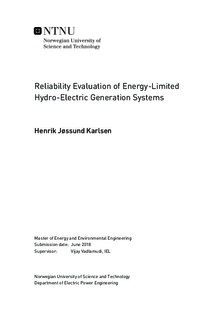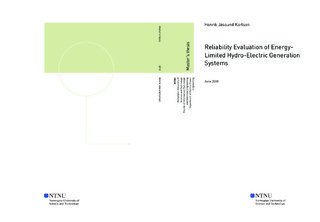| dc.description.abstract | Reliability studies are an essential part of power system planning and operation studies. A wide range of reliability indices is used by system planners and operators to ensure successful operation of power systems against random failures both in the planning and operational horizons. In generation system reliability studies, it is usual to consider the energy source for generation as always available. This implies that unavailability of generation is solely on account of a generation unit of the power plant; in the case of hydro generation, if the reservoir is sufficiently large enough to guarantee the availability of energy, through a constant regime of inflows, such modelling is correct. However, stochastic nature of inflows and reservoir limitations make hydro generation energy-limited.
In this thesis, multiple methods for incorporating energy-limited hydro generation units in generation system reliability studies, from the literature, have been examined. Three of the methods have focused on hydro generation units with reservoir limitations, meaning that each hydro unit only has a fixed amount of water available for generation. The capacity modification method (CMM) treats the limited hydro units as non-limited, but with a modified capacity depending on the capacity-probability table and the energy distribution of the unit. The same applies to the forced outage ratio (FOR) modification method, only with a modified probability instead of capacity. The massive benefit of these methods is that they treat the units as non-limited, which means the energy-limited units can easily be implemented in reliability test systems. The load modification method (LMM) makes use of the energy-limited units to reduce the load duration curve (LDC), and with the remaining non-limited units calculates the reliability indices. The method produces accurate results, but gets complicated as the number of energy-limited units is increased as this also increases the number of load steps. The methodological approaches are illustrated for simple systems for conceptual clarity.
A model of a run-of-the-river (ROR) power plant for evaluating power system reliability, from the literature, is also examined. The model considers the uncertainties of both river inflows and component failures, where the river inflows and component failures are modeled as a stationary stochastic process by a multiple state Markov model. The stochastic system is solved with linear algebra, and the steady-state probabilities of all capacity states are obtained. The final capacity-probability table represents a ROR power plant well, and can be used in other reliability evaluations. The river inflow values at Solbergfoss in the river Glomma in Norway are used in a case study, and the vast number of river inflow values are reduced by the statistical clustering technique k-means. The ROR model is then extended, again based on suitable existing literature, to also take into account the modelling of failure rates of all the components of a typical ROR plant.
The CMM and the extended ROR model are utilized on two reliability test systems, the Roy Billinton Test System (RBTS) and IEEE Reliability Test System (IEEE-RTS), to demonstrate the impact on system reliability from energy-limited units. The results show a significant effect from reservoir limited hydro units on the system reliability, and the energy-limited hydro units should thus be included in reliability evaluation. The ROR unit is compared to a conventional unit of the same size. The ROR unit strengthens the reliability, but not as much as the conventional unit; this means if the same reliability output is desired, a larger ROR unit must be used. | |

